What we know about Israel's missile attack on Iran
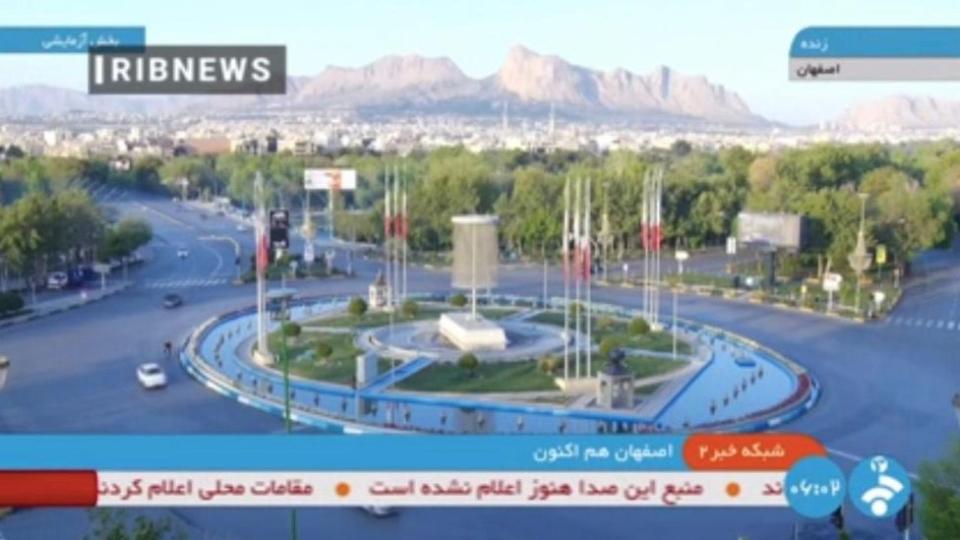
US officials say Israel hit Iran with a missile in the early hours of Friday, in what appears to have been a retaliatory strike after weeks of escalating tensions between the two countries.
There are competing claims about the scale of the attack on the Isfahan region and the extent of any damage, with Iranian state media downplaying its significance.
It comes after weeks of soaring tensions between the regional rivals, which have already seen an Israeli attack on an Iranian compound in Syria, and Iran launch an unprecedented assault against Israel.
Here is everything we know about the latest incident so far.
How do we know there has been a strike?
Israel does not routinely confirm its military actions, which have targeted Iranian-backed armed groups in Syria and Iraq on many occasions.
However, US officials have confirmed to the BBC's partner CBS News that an Israeli missile did hit Iran.
US sources say a missile was involved in the attack, while Iran says it involved small drones.
Iran's government tightly controls access to the country. The BBC does not have direct access to the central region of Isfahan, where this incident played out overnight.
What weapon may have been used?
So far, there has been a lot of speculation regarding the type of missile used.
BBC Verify has tried to identify the weapon by analysing images of wreckage posted from an area in neighbouring Iraq, 60km (45 miles) south-west of the capital Baghdad.
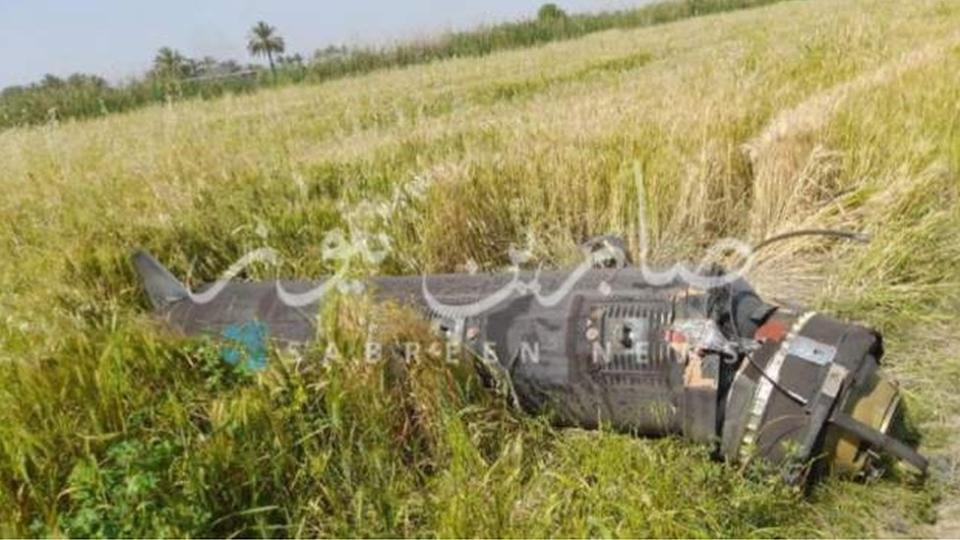
Among experts, there now seems to be a wider consensus in thinking that a two-stage missile was used - and was probably air-launched. Many identify the debris with Israeli-produced Blue Sparrow missiles.
Justin Crump, a former British Army officer who runs risk intelligence company Sibylline, agreed that the debris seen in the pictures was probably from a missile booster "with the warhead having detached and presumably gone on to achieve its mission - this is the motor which falls to earth".
"The booster has attachment points typically used to connect to an aircraft and its general size suggests it may have been an air-launched system," Crump said.
Although we cannot yet independently verify the exact type of missile, it is known that Israel has developed this type of weapon.
"Israel has previously used such weapons in Syria, so this is well within their capabilities," Crump added.
What is Iran saying about the strike?
Some Iranian officials and media have confirmed there was an attempted strike but are downplaying the significance of it. There have been no reports of casualties.
Iran's Fars news agency says explosions were heard near an army base and air defence systems were activated.
Explosions heard in the Isfahan area were "due to air defence firing at suspicious objects" and there was no damage, a state media channel quoted a general as saying.
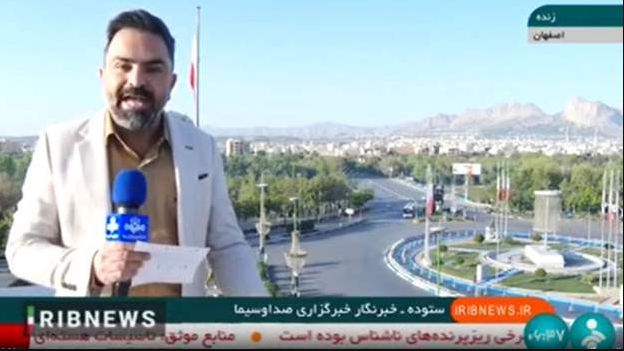
The semi-official Tasnim news agency, which is close to the powerful Islamic Revolution Guard Corps military wing, posted a video of a nuclear facility in Isfahan which did not show any signs it had been hit.
The International Atomic Energy Agency has confirmed there was no damage to Iran's nuclear sites.
Hossein Dalirian, a spokesman for Iran's National Centre of Cyberspace, said there had been "no air attack from outside borders".
He said Israel had "only made a failed and humiliating attempt to fly quadcopters [drones]" which had been shot down.
Iran imposed restrictions on commercial flights in the hours immediately after the strike but they have now been lifted.
Explosions were also reported overnight in Iraq and Syria - where armed groups backed by Iran operate - but it is unclear if they were directly linked to the Isfahan strike.
The Syrian defence ministry said an air defence site in the south of Syria had been hit by an Israeli missile in the early hours of Friday morning local time. Israel has not confirmed it was behind the strike.
Why was Isfahan targeted and why now?
Isfahan province is a large area in the centre of Iran which takes its name from its largest city.
The region is home to significant Iranian military infrastructure, including a large air base, a major missile production complex and several nuclear facilities.
Israel would usually tell the US in advance about military action, but Italy's foreign minister Antonio Tajani told reporters at the G7 meeting in Capri that Washington had only been "informed at the very last minute".
Speaking at the summit, US Secretary of State Antony Blinken refused to be drawn on the attack, saying only that the US had "not been involved in any offensive operations".
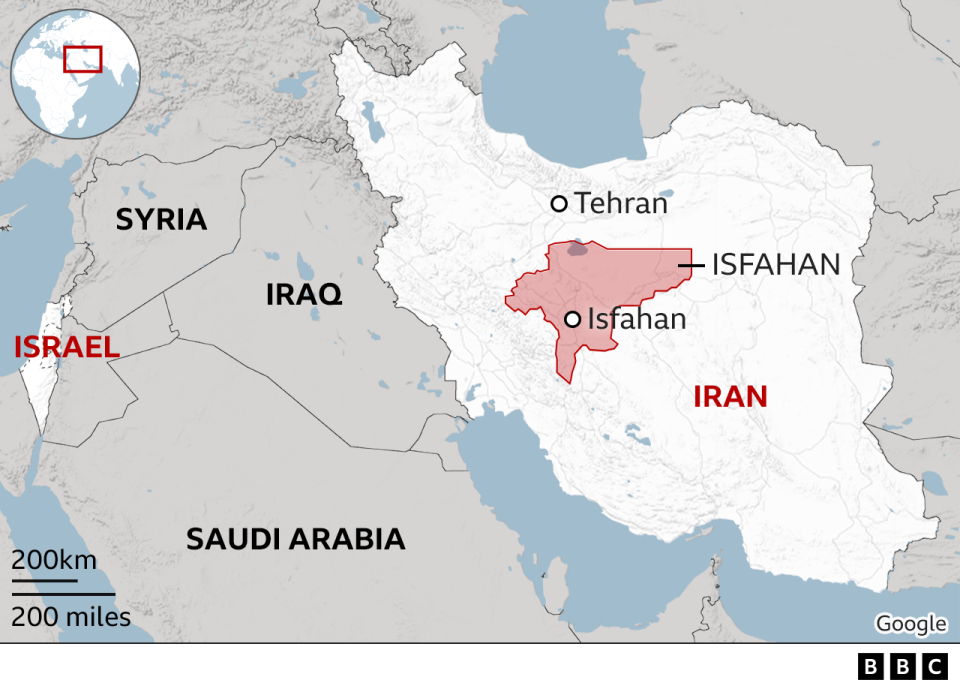
This latest strike comes less than a week after Iran launched hundreds of missiles and drones at Israel, an incident seen as a dramatic escalation in tensions.
Despite its vast scale and unprecedented nature, Iran's attack was largely unsuccessful, with the vast majority of projectiles shot down by Israeli air defences with the help of the US, UK and other allies.
That unprecedented attack on Israeli soil was in response to a strike against a building on an Iranian diplomatic compound in Syria on 1 April.
Israel has not publicly confirmed it was behind that strike either, but it is widely accepted that it was.
BACKGROUND: Why have Israel and Iran attacked each other?
ANALYSIS: Crisis shows how badly Iran and Israel understand each other
Will this increase tensions between Israel and Iran?
The full significance of this latest strike is still becoming clear and it is not yet known whether Iran will seek to respond.
BBC security correspondent Frank Gardener describes the scale of Friday's attack as limited and potentially designed to ensure the conflict goes no further.
Israeli Prime Minister Benjamin Netanyahu will come under competing pressures from some of his own generals and political allies to push back against Iran, according to BBC international editor Jeremy Bowen.
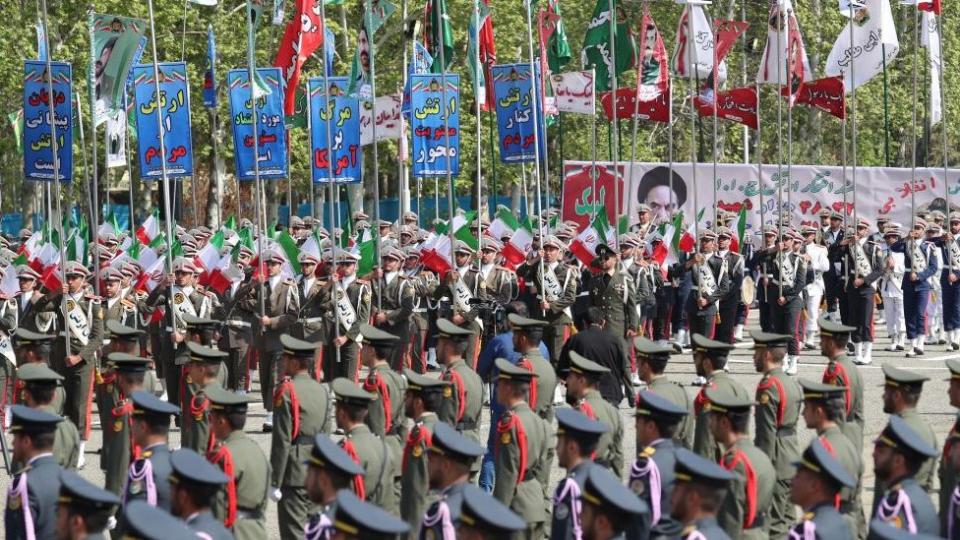
Israel has come under huge international pressure from the US and other Western allies not to take any action which risks turning the long-running proxy war between the two Middle East rivals into a direct conflict.
This flare-up in hostilities comes against the backdrop of the war in Gaza, where the Israeli military is fighting Iran-backed Hamas.
What has the reaction in Israel and around the world been?
Some of the responses from within Israel have highlighted the country's political divisions.
Ultranationalist Security Minister Itamar Ben Gvir described the strike on Iran as "feeble" or "lame".
In response, Israeli opposition leader Yair Lapid called for him to be sacked, and said his remark had ridiculed and embarrassed Israel.
The UK government said it would not speculate on the strike, but said Israel should avoid "significant escalation" while exercising its "right to self-defence".
European Commission President Ursula von der Leyen called on all sides to refrain from further action.
How has the world economy reacted?
There are concerns a worsening conflict in the Middle East could disrupt oil supplies.
Brent crude, the international benchmark for oil prices, rose by 1.8% to $88 a barrel after the attack.
Oil prices had jumped by as much as 3.5% initially but the price stabilised when it became clearer the strike was limited.
The price of gold - which is often seen as a safe investment at times of uncertainty - briefly came close to a record high before falling back to nearly $2,400 an ounce.

 Yahoo Sports
Yahoo Sports 